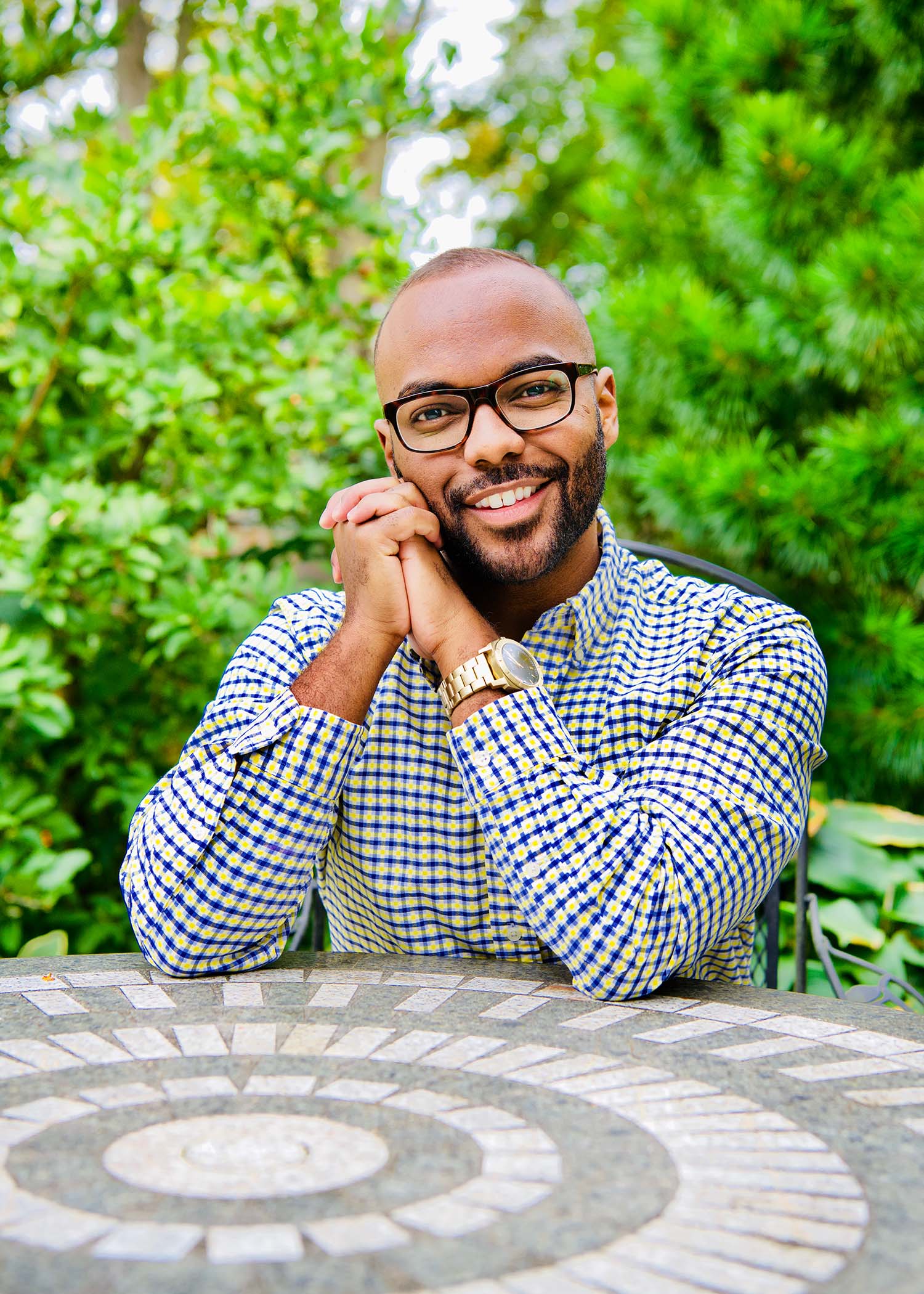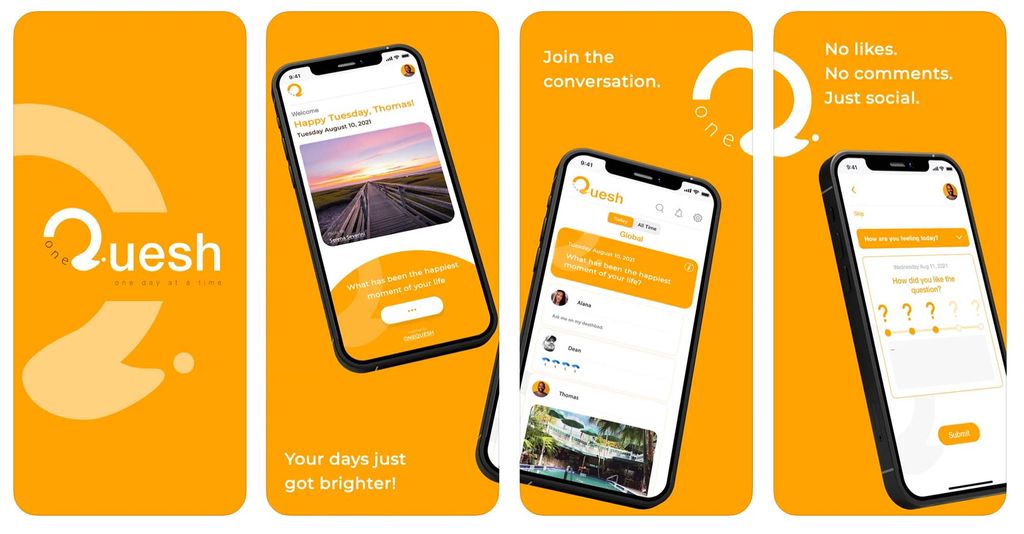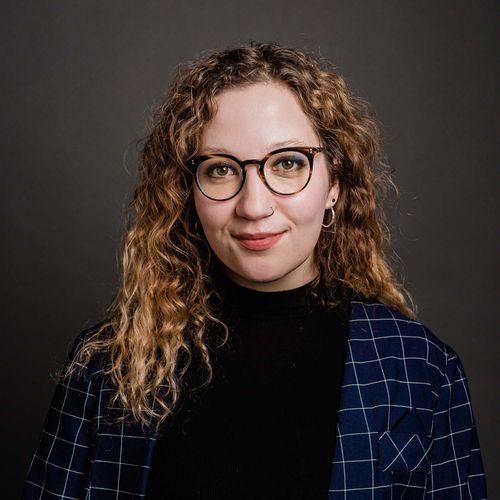This BU Alum Wants to Take the Toxicity Out of Social Media

Cofounder Thomas Andrews (SHA’15) launched the OneQuesh app in October 2021, after kicking around the idea for years. Courtesy of Andrews
This BU Alum Wants to Take the Toxicity Out of Social Media
Thomas Andrews (SHA’15) created OneQuesh to get you reflecting on yourself and the people around you
Thomas Andrews is learning about venture capital.
Why is that relevant? Because it was his answer to the question of the day on OneQuesh, the nontoxic social media app Andrews (SHA’15) cofounded with his childhood friend Alana Ginnard, the day we spoke to him.
Questions like this are quite literally the bread and butter of OneQuesh, which launched for iOS and Android in October 2021. Every day, users are prompted to answer a single question dreamt up by the OneQuesh content team: questions have included that day’s What are you learning about? and others like How easily do you fall in love? and Blue cheese or ranch? The answers are then collected in a feed for other users to peruse.
But this is where OneQuesh differs from other social media apps: here there are no likes or comments allowed. Instead, OneQuesh is designed to get people reflecting on themselves and the infinite variety of the human experience—without devolving into arguments.
“Social media has just become so divisive,” Andrews says. “We needed something to escape from the toxicity on other platforms and bring people together by discovering our similarities and understanding our differences.”
Importantly, you can’t see everyone else’s responses until you answer the question yourself. (“You have that moment to be reflective with yourself before the world bombards you with their opinions,” Andrews explains.) And although you can see other users’ answers, you can’t directly interact with them on OneQuesh. You can, however, “collect” individual responses, follow users, and view their profiles. Everyone also has the option of linking their other social media accounts, so if you want to start a conversation with someone, you can hit them up elsewhere.
“We’re encouraging a ‘be and let be’ mentality,” Andrews says.
User Nick Chacos joined the app when it first launched. He used to journal in his younger days, but gave it up as he got older. After initially using OneQuesh on and off, he began starting his mornings on the app, using the daily question to re-center himself as he did in his journaling days. “OneQuesh asks users to be introspective; I’m not just scrolling and mindlessly consuming content,” Chacos says. “It stimulates that creative journalistic feeling, which over time starts to feel therapeutic. I look forward to each question and where it will take me.”
The idea for a question-based app first hit Andrews in 2013, back when he began working in the University’s Orientation program and was getting to know fellow staffers and students. It wasn’t until after he graduated, however, and entered the marketing world and started working alongside entrepreneurs that he seriously considered starting his own venture.
In fact, he did start his own venture—a men’s underwear line called Dapper & Down, also created with Ginnard—and he was on the verge of pouring capital into it when the pandemic hit. Andrews and Ginnard suddenly found themselves needing to pivot. The result? OneQuesh.

It was the pandemic’s early days, with the polarizing discourse over lockdown mandates, Black Lives Matters protests, the upcoming presidential election, and more. “I asked myself, ‘What’s something I can bring into the world right now to meet the moment we’re in?’” he says. “We needed something to kind of rediscover ourselves in the world around us.”
So he and Girard got started on OneQuesh. The app launched almost 18 months later. Since then, OneQuesh has received just over 2,000 answers from its users, who have happily shared their thoughts on their favorite movies, hobbies, what kind of dog breed they would be, and more.
The app’s data analytics—which include stats on response rates and how much users like individual questions—are done by a team of Questrom students. Since Andrews minored in business, it’s been rewarding for him to employ students from his former college, he says.
And oh yeah, back to venture capital: the OneQuesh team is currently in the process of growing its business opportunities. One such aspect is curating partnerships. In his perfect world, Andrews explains, he’d like to partner with brands like Starbucks and Ben & Jerry’s to create brand-specific questions. (Think: What’s your go-to Starbucks order? or If you could create the next Ben & Jerry’s flavor, what would it be?) In the meantime, they’re working on a Cards Against Humanity–style OneQuesh card game meant to test how well you know the people in your life.
As one of the users with the “best answers,” per Andrews, Chacos appreciates the candor users bring to OneQuesh. He and Andrews both cite the app’s positive effects on their mental health—a rarity in today’s social media landscape. “It’s kind of like you get to sit in a group where everyone goes around and shares,” Chacos says. “It’s refreshing. I honestly think that if people allow themselves to be vulnerable on the app, it can help with their mental health.”
The question of the day on a late January morning: What has been the best part of this month? The answers were as varied as the users—someone hit their first rail on their snowboard, someone else reunited with a friend for the first time in seven years, and another cited staying home every night. A fourth simply responded with a “party face” emoji.
The answers are a reminder that we all place different values on different parts of our lives, and that we can’t judge anyone by the same standards we judge ourselves by. In fact, it’s a quiet celebration of the many permutations of being—and that it’s okay to not be in lockstep with the people around you.
And the fact that an app is serving us life lessons on the regular? That’s okay, too.

Comments & Discussion
Boston University moderates comments to facilitate an informed, substantive, civil conversation. Abusive, profane, self-promotional, misleading, incoherent or off-topic comments will be rejected. Moderators are staffed during regular business hours (EST) and can only accept comments written in English. Statistics or facts must include a citation or a link to the citation.